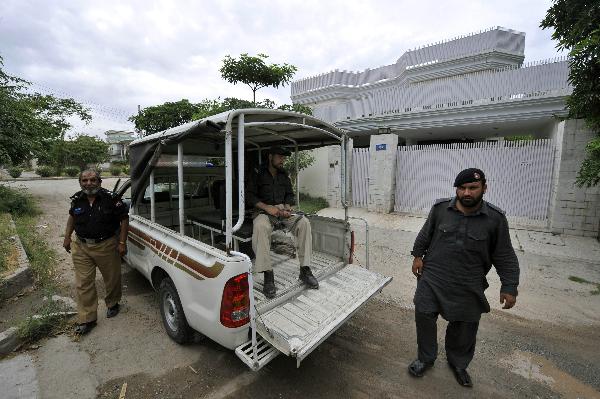| Faisal Shahzad, suspect of the failed Times Square car bombing attempt, has waived his right to a speedy arraignment, a sign indicating he is willing to provide more valuable intelligence, local media said Wednesday.
 |
|
Policemen stand in front of residence of Pakistani-American Faisal Shahzad in Peshawar, Pakistan, May 5, 2010. In the wake of the arrest of a U.S. citizen of Pakistani origin in New York, Pakistani law-enforcement agencies swung into action on Tuesday and nabbed several suspects, local newspapers reported Wednesday.[Xinhua/AFP Photo] |
According to The New York Times, Shahzad "has waived his right to a speedy arraignment and was not expected to appear in court on Wednesday," citing a person briefed on the case as saying, adding that no court appearance has been scheduled.
U.S. federal authorities have said that Shahzad, 30, "began cooperating after his arrest late Monday night and has provided valuable intelligence," in addition to admitting that he drove the car bomb into Times Square and received bomb-making training in the tribal regions of Pakistan.
Shahzad was arrested as he was trying to flee the country in a Dubai-bound jet late Monday. He was charged on Tuesday with several terrorism-related crimes. American intelligence officials said that while any ties Shahzad had to international terrorist groups remained "murky," and investigators were strongly looking at "possible links" to the Pakistani Taliban in the attempted attack on Saturday.
"If the role is confirmed, it would be the group's first effort to attack the United States and the first sign of the group's ability to strike targets beyond Pakistan or Afghanistan," says the Times.
That Shahzad has waived his right to a speedy arraignment "suggests that he is continuing to provide valuable information to Preet Bharara, of the Manhattan United States attorney's office," which is prosecuting the case, and the FBI agents and police detectives who conducted the investigation, says the Times.
Under the law, a person who is arrested and charged with a federal crime must be brought before a judge and advised of his or her rights and the charges against them within a reasonable period of time -- generally 24 hours or 48 hours if the arrest occurs on a weekend. A defendant can waive that right.
According to The Washington Post, the U.S. government on Wednesday began requiring airlines to check no-fly lists much more quickly as a way to screen out terrorist suspects, after revelations that Shahzad was able to board an international flight even though his name was put on a watch list.
Until now, airlines have had 24 hours to check the list after they are notified that a name has been added to it through a special, expedited process that indicates a high level of potential risk.
Starting Wednesday, they must check within two hours, says the paper.
New York Mayor Michael Bloomberg called on the U.S. federal government to tighten gun and explosive regulations so suspected terrorists will no longer be able to buy weapons while testifying before the Senate Homeland Security panel in Washington D.C. on Wednesday. |

